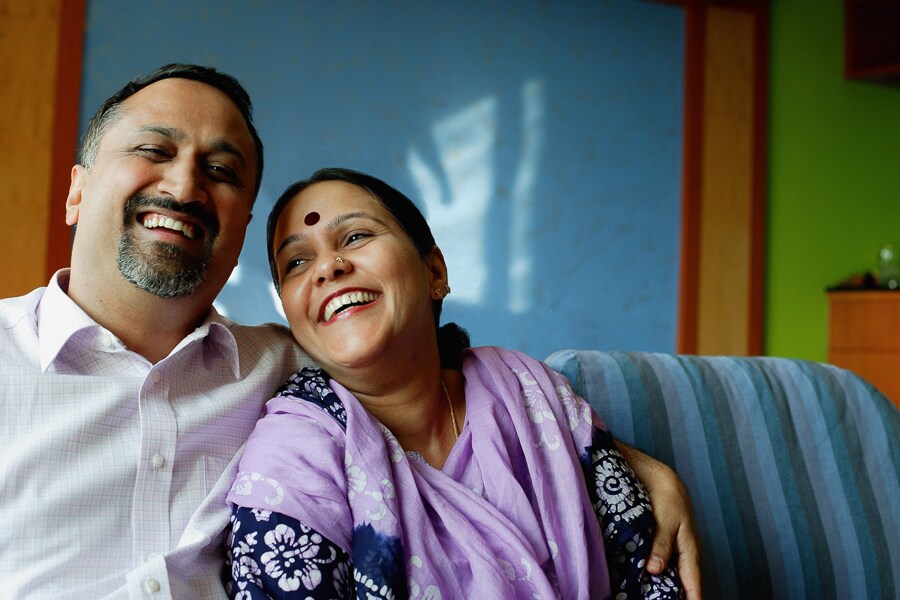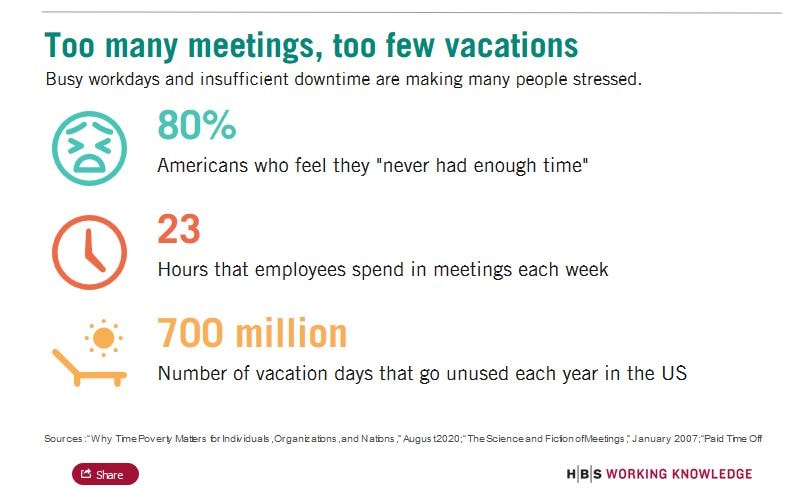
Want to be happier? Make more free time
Enjoying life requires time, but too often we willingly give it away in pursuit of money and career. Ashley Whillans shows how to restore the proper balance.
 Image: Shutterstock
Image: ShutterstockAfter earning a doctorate, Ashley Whillans received two tempting job offers: one in her hometown, where she could remain close to family and friends and work reasonable hours for the local government, and another that required a cross-country move and promised more money and prestige.
Without much hesitation, she opted for the higher-paying position in a new city, figuring it would be an adventure with her partner of eight years and lead to more exciting work opportunities down the road.
It’s a choice many people face at key times in their life. What should we pursue more: money and career, or free time and family?
Soon after settling into her dream job, Whillans worked and traveled constantly, but her partner was miserable, with no job or friends nearby. During one work trip, the couple was fighting long distance, and Whillans barely made it to Cornell University in time to give a talk about her research. The topic of her presentation: the mistake we often make in chasing a higher paycheck at the expense of quality time with loved ones.
“I started talking to this roomful of people about how our time matters and working too much can affect our relationships,” says Whillans, a Harvard Business School assistant professor. “I tried to put my professor face on but, really, I was devastated because my relationship was breaking up, and I realized: I wasn’t living my own research.”
After her partner walked out—plus she missed her cousin’s funeral and a chance to meet her best friend’s newborn because of work trips—Whillans spent that Christmas alone in her apartment reflecting on her missteps and started writing her book, Time Smart: How to Reclaim Your Time and Live a Happier Life, which will publish October 6.
“I was justifying my choices by telling myself what a lot of us tell ourselves: that we’re working hard now so we will have more time to be happy later,” she says. “We all need to make better decisions on the margins, so we don’t wake up one day like I did and ask, ‘What have I done?’”
Happiness is … more time, not more money
When people invest too much time and energy into making more money, it’s often because they assume the extra cash will bring greater happiness. But they are wrong. People with more free time are actually happier, healthier, and more productive than people who work all the time and make more money, according to Whillans’ research, including a 2019 study (pdf) of working adults in 79 countries.
Too much work and not enough play is making an increasing number of people feel “time poor”—stressed from having too many things to do and not enough time to do them. In 2011, 70 percent of working Americans reported that they “never had enough time,” and by 2018, that number increased to 80 percent, according to Gallup US Daily Poll data.
How do we free up time and improve our moods? Whillans says it starts with prioritizing activities that bring us joy—savoring a well-cooked meal with a spouse, taking a leisurely walk with a friend, reading a book to a child—and minimizing the time-sucking nonsense that drags us down, like long commutes, household chores, and mindless scrolling on social media.
We must make deliberate, sometimes difficult choices that protect the precious hours in our days, Whillans says, whether it’s a big decision like pursuing a less-demanding career or a smaller one like opting to take the handful of vacation days we normally let go unused.
“In the moment, these decisions may seem inconsequential or easy to reverse, but they’re not,” Whillans says. “We don’t realize it, but all of our daily choices, like whether to socialize and exercise rather than work longer hours, add up to a lot of time. And our choices powerfully shape whether we’re happy or not.”
Here, Whillans shares six research-based strategies for managing the minutes on the clock, all with the ultimate goal of enjoying both our work and personal time more:
1. Prioritize important work and fend off interruptions.
On average, business professionals spend 23 hours a week trapped in meetings, and a recent survey (pdf) of more than 700 workers revealed that 99.9 percent were routinely asked to complete unimportant tasks that were time-wasters, such as unnecessary phone calls, emails, and paperwork.
Workers often stretch themselves thin by allowing a colleague’s sense of urgency about something minor interrupt their more important work. After all, responding to multiple emails the moment they hit our inbox may lead to a time crunch on the more crucial projects we really need to get done. In fact, when we are distracted from a task, it can take 19 minutes to refocus on what we were doing, according to creativity expert Teresa Amabile, Edsel Bryant Ford Professor of Business Administration, Emerita, at HBS.
One solution: Block off time on your calendar to tackle your most challenging work, particularly when your energy is high, and focus on giving it your undivided attention by turning off distracting notification pings on your phone, email, and Slack channels. In a recent study, computer engineers who were encouraged to schedule specific times to get their core work done said they had greater control over their workdays, were less stressed, and were happier with their jobs overall, Whillans found (pdf).
Also, be aggressive about shielding your time in other ways, Whillans advises. Set a quota on work travel—say, one trip per quarter—even if pursuing a less hectic pace may mean sacrificing career advancement. Also, default to saying “no” for most unplanned, last-minute impositions on your time, especially requests that benefit someone else, like a side work project. While you may say “yes” to a quick conversation when someone wants to bend your ear, be stricter about saying “no” to taking action when you are feeling overwhelmed by your jam-packed schedule.
2. Request deadline extensions when needed.
People often assume managers will consider them less competent if they ask for more time to complete a project. But Whillans’ research (pdf) shows that supervisors are actually more willing to grant extensions than employees realize; in fact, they tend to view those who request extra breathing room as highly motivated employees who are intent on producing better results.
So if a work deadline feels too tight to get the job done right, don’t be afraid to speak up, Whillans suggests.
“We forget that just as we can negotiate for a higher salary and other benefits, we can also negotiate for more time at work,” she says.
3. Throw money at the problem.
Venture capitalists often advise startups to outsource work that isn’t core to their entrepreneurial idea so they can focus on mission-critical tasks.

Similarly, you can free up time for important or enjoyable activities by buying your way out of chores and other unpleasant experiences. Outsourcing grocery delivery, house-cleaning, and takeout is worth the expense because it eliminates drudgery from our days, which leads to greater life satisfaction, Whillans’ research shows.
“It may feel like an extravagance, but if you removed your most disliked tasks even half the time or when your schedule is especially tense, it will pay off,” Whillans says.
Many people also waste too much time trying to find the cheapest prices, whether by driving out of the way for the least-expensive gas or schlepping to multiple stores for slightly lower prices. In many cases, we would be happier if we spent a little more money and spared ourselves the trouble, Whillans says. Before booking a trip with connecting flights for a slightly cheaper price, think about whether it’s worth the extra traveling fatigue versus relaxing a few more hours on vacation.
“We often reflexively go for the lowest cost when we shouldn’t,” Whillans says.
4. Pencil in slack time.
Whillans advocates for spending more time on enjoyable activities, but that doesn’t mean you should try a new recipe, go for a run, and listen to a podcast all on the same Saturday morning.
“Don’t add so many positive activities that you spend your leisure time rushing around,” Whillans says. “These fun things will start to feel like obligations, and you’ll get exhausted trying to keep up.”
Instead, build slack time into your day—small buffers of 15 minutes or longer between work appointments or social commitments that allow for downtime or spontaneity.
5. Take those vacation days.
But clearly, we need more than 15 minutes here and there. Longer periods of rest are key to our happiness, yet many workers don’t take enough time off. More than 700 million vacation days go unused each year, 5.6 billion hours that could be spent relaxing, rather than working, research shows. In one survey (pdf) of American workers, 75 percent said they did not take all of their paid vacation days.
After taking time off, most employees report feeling more energetic—and they are also more engaged, creative, and productive at work than those who don’t take vacations, research shows. People benefit most when they take time off regularly, probably because that post-vacation glow can evaporate quickly once work madness sets back in. So we may be better off taking shorter breaks periodically, rather than longer ones less frequently. And when we do take vacations, we should resist the urge to check work email or make phone calls and instead unplug completely, Whillans says.
“This is probably our most egregious misuse of our time and the simplest way to increase our happiness,” Whillans says. “When we’re burned out, we produce bad work and get demoralized. We all need time off to recharge, but we’re not taking enough of it.”
6. Savor your free time.
It’s not enough to seek more leisure time; we also need to consciously appreciate it. In the book, Whillans writes about a couple who took an expensive dream trip to Italy for three weeks. When the trip didn’t go perfectly—he got heatstroke, they missed a tour of the Vatican, and it rained for two days straight—the couple fought so much over whether the trip was worth the high price tag that the husband threatened to take the next flight home.
But back home in America, when they looked at their photos of eating squid ink pasta in Venice, walking on beaches, and tasting olive oils in Tuscany, they realized they were glad they had gone, and regretted fretting about the hiccups and cost.
“Thinking about the economic value of our leisure time can undermine our enjoyment of it, especially when it’s not living up to some perfect ideal in our minds,” Whillans says. “We have to disconnect the experience from money, since that doesn’t adequately measure its value.”
Use it or lose it
Tending to our time takes careful thought and planning, since it’s easy to unconsciously get sucked into work demands that consume our days. During the COVID-19 pandemic, with many people’s work and home lives blurring into one, it may take extra vigilance to set limits on our time.
When we start to feel crazy-busy and stressed, Whillans advises, we should ask ourselves: Are our days stacking up the way we want to live our lives, or are we sacrificing our best years based on the assumption that we can make time for joy tomorrow?
“We don’t understand well that our time is finite and we should put it first,” she says. “All of us are living lives that are slowly slipping away, so if something makes us happy or gives us purpose, we need to hold onto it.”
Dina Gerdeman is a senior writer for Harvard Business School Working Knowledge.
This article was provided with permission from Harvard Business School Working Knowledge.






